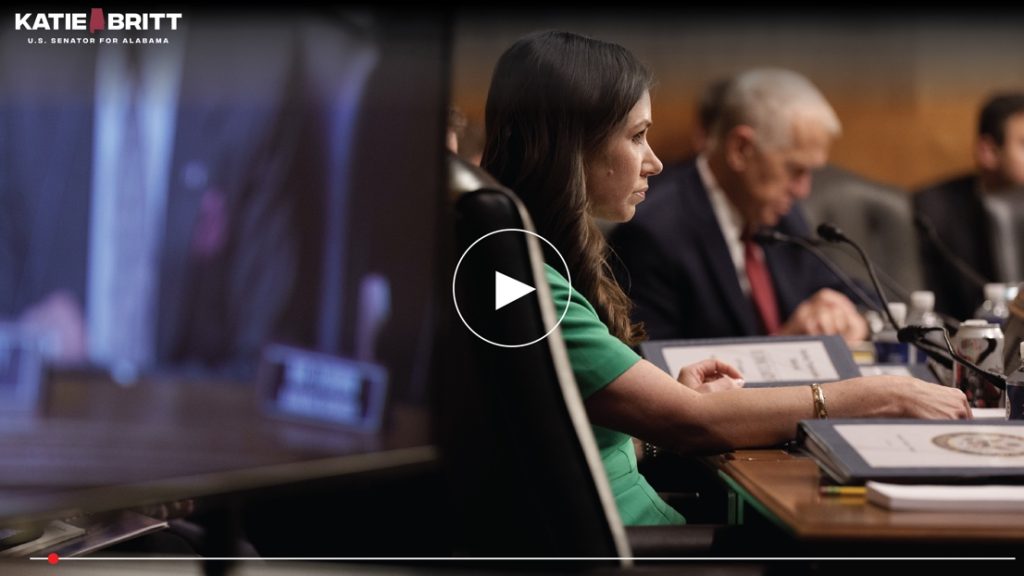U.S. Senator Katie Britt Addresses Gaps in State and Local Authorities to Defend Against Drones
WASHINGTON, D.C. – U.S. Senator Katie Britt (R-Ala.) attended a Senate Judiciary Committee hearing entitled “Defending Against Drones: Setting Safeguards for Counter Unmanned Aircraft Systems (UAS) Authorities.” The hearing witnesses included: Captain Troy Wilson, a UAS program coordinator for the Texas Department of Public Safety; Sergeant Robert Dooley, a UAS program coordinator for the Florida Highway Patrol; and Secretary Ricky Dixon with the Florida Department of Corrections.
Senator Britt began her line of questioning by outlining the importance of state and local law enforcement of being granted counter-UAS authorities: “We want to make sure that public safety comes first. Even when it comes to federal installations in Alabama, it’s often state and local law enforcement and personnel who are the closest and most capable of actually responding. We see this, too, [in] our Alabama Law Enforcement Agency [which] is headed by Secretary Hal Taylor, who does a tremendous job. They assist federal partners and are likely the first ones to be able to respond and to do it in a meaningfully and efficient way. But without proper authority, they can’t act with the speed and coordination that they need that matters most in a time of a crisis.”

The Senator continued, asking, “Is there a legislative solution that is as simple as just extending existing mitigation authorities to state and local law enforcement that would actually help in these situations? Or [are] there other gaps in the law that need to be considered? And what should our top priorities be when considering a legislative solution to actually address this issue?”
“. . . There has to be training, there has to be some accountability, there has to be transparency for all the agencies that start, and you’re going to have to start somewhere with some credentialing of some law enforcement agencies at the appropriate level,” Captain Wilson responded.
“What are things that we could be doing right now to make sure that we’re preparing for that, that we’re taking proactive steps to be able to allow state and local law enforcement to have this capacity or this ability in the future?” Senator Britt asked.
Sergeant Dooley responded, highlighting the need to establish “. . . who would run this from a federal level. Once we get started with that, then we start figuring out how we should roll this out, who should be a part of the initial rollout, and what type of equipment we should be using, and more importantly, some type of process in place of standardizing how this is used – a reporting process in place to where if I do deploy something and we do detect and we do mitigate or whatever it is, but there is proper . . . accountability . . . I think we should identify a federal entity of some sort that should control this moving out towards public safety.”
In her final line of questioning, the Senator asked Secretary Dixon about challenges related to drone mitigation around correctional facilities and legislative solutions that would address these issues, stating, “In Alabama, like most other states, we have seen an increase in drones using to fly contraband into correctional facilities. As you have testified today and spoken with my colleagues about that presents a real risk, not only to inmates, but obviously the officers as well.”
Secretary Dixon responded, saying, “. . . They fly high, they’re fast, they’re swift. So often the contraband is delivered and we never saw it coming, so we’re defenseless. We have limited systems that help detect when they’re coming in, but not nearly as advanced as they should be and as the technology is capable to deliver right now if we had the federal authorities we need.”
“. . . I would encourage us to act with the same sense of urgency that we would if we were watching on the news right now, that multiple automatic weapons were just delivered into one of our compounds by drone and to gang members, and they escaped or harmed or killed other inmates or staff, because that is a very likely scenario,”Secretary Dixon concluded.
The Senator’s line of questioning can be viewed here.
Recently, Senator Britt joined several of her Senate colleagues in counter-UAS legislation led by Senators Tom Cotton (R-Ark.) and Kirsten Gillibrand (D-N.Y.), theComprehensive Operations for Unmanned-System Neutralization and Threat Elimination Response (COUNTER) Act. The bill would enhance airspace security at military installations, and would enable more bases to apply for approval to detect, track, and if necessary, neutralize drones.
###